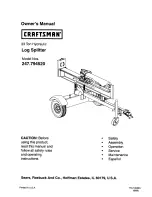
Before Each Use – Inspection / Maintenance
13
Step One: Inspect and maintain log splitter before each use.
If the log splitter has been used previously, it must be inspected and maintained BEFORE EACH SUBSEQUENT
USE.
WARNING
ALWAYS shut off the engine, disconnect the spark plug, and relieve system pressure before inspecting, cleaning,
adjusting, or repairing the splitter. Relieve system pressure by moving the split control lever back and forth several
times.
Important:
If a part needs replacement, only use parts that meet the manufacturer’s specifications. Replacement parts that do
not meet specifications may result in a safety hazard or poor operation of the log splitter.
1. Engine off / relieve
hydraulic pressure
Perform all inspections/repairs with the engine off and hydraulic system
pressure relieved.
1.
Make sure engine is off and cool.
2.
Disconnect the spark plug
3.
Relieve all hydraulic system pressure by moving the split control lever back and
forth several times.
2. Remove debris
Remove debris from engine, muffler, and moving parts.
1.
Engine debris.
Debris on a hot engine can be a fire hazard. Clean debris and
chaff from engine cylinder head, cylinder head fins, blower housing rotating
screen, and muffler areas. Avoid contact with hot muffler.
2.
Other debris. Debris on moving parts can cause excess wear. Clear debris from
the beam, wedge, log stripper, and end plate.
3. Fuel tank / lines
Check fuel tank and fuel lines for leaks.
Any fuel leak is a fire hazard. Fix any fuel leaks before starting engine.
4. Mechanical parts
Check to be sure all nuts and bolts are tight
to make sure the log splitter is in safe
working condition. Refer to Bolt Torque Chart on pg. 25.
Apply grease to beam where the wedge travels.
Apply grease to
the top of the
beam and
underneath the
edge of the beam
Some features
have been hidden
for clarity.














































